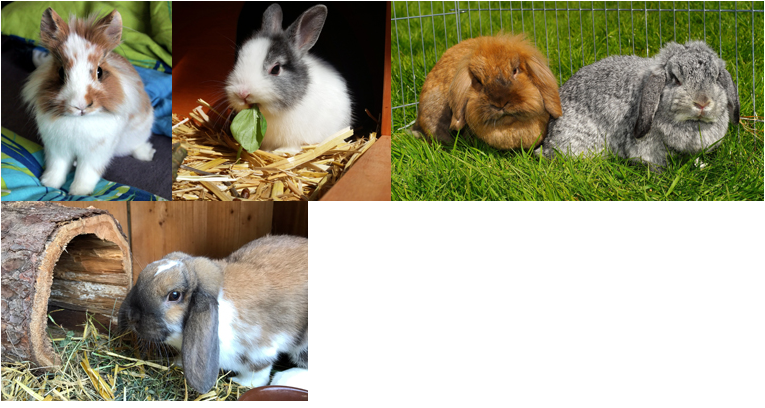

Rabbits were originally domesticated in Europe during the middle ages. They were raised in colonies as livestock for food. In the wild, rabbits are prey animals and many of the behaviors of domestic rabbits are directly associated with their natural instincts.
Rabbits are primarily fed a pelleted diet. Traditionally these pellets are made from pelleted timothy and alfalfa hay. Timothy hay is a better option for adult rabbits because it contains the proper amounts of protein and fiber adult rabbits need to thrive.
Timothy hay, either in cube form, loose or from bales should be offered at all times in addition to the daily diet. We also suggest providing plenty of fresh leafy greens such as dandelion leaves, kale, endive, and romaine lettuce. Small quantities of fresh carrots, apples, banana, papaya, and even raspberries may be offered as treats.
It’s safe to feed Guinea Pig pellets to rabbits in an emergency, but it’s not safe to feed rabbit pellets to Guinea Pigs.
If the daily diet is not vitamin-fortified, we suggest supplementing their diet with a daily multivitamin.
Fresh water should always be available in a water bottle specially designed for small animals.
Rabbits can be kept in cages indoors, or in hutches outdoors in moderate climates. If the cage or hutch has a wire bottom there should be a solid floor in part of the cage so the animal isn’t constantly standing on wire.
A layer of bedding material should cover the bottom of the cage and a hiding space is also recommended.
Rabbits are gentle animals that require very little care compared to other pets. If handled regularly, they remain tame and docile.
Slide your hand under the rabbits chest and gently lift while supporting the hind end with the other hand. Bring the animal towards your chest to keep it from falling. Be sure the rabbit does not escape from your grasp and fall to the floor.
Various bedding options are available from wooden chips to alternative fibers. We recommend aspen shavings or paper fiber. Both of these types of bedding help reduce the risk of respiratory problems and other issues associated with the phenols contained in aromatic wood shavings.